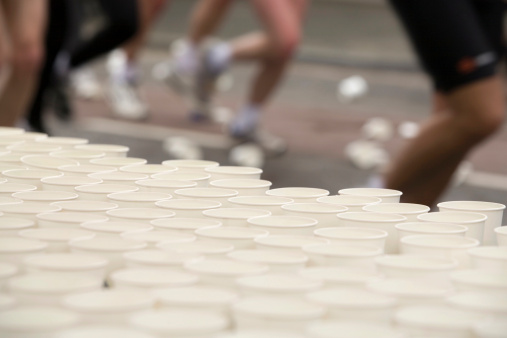This is the first in a three-part series on training for the Pittsburgh Marathon.
Eat, drink and be wary.
In moderation, of course, when preparing for long-distance races such as the Dick’s Sporting Goods Pittsburgh Marathon.
That was the message – filled with fun and down-to-the-fraction formulas –delivered by runner, author and sports-nutrition expert Leslie Bonci, R.D., at the second seminar in a marathon-prep series sponsored by UPMC Sports Medicine.
Bonci, director of sports nutrition at the UPMC Center for Sports Medicine, began by talking about the importance of drinking to the 75-plus runners gathered Saturday inside the Ladies Hospital Auxiliary Society Auditorium at UPMC Montefiore. She told them not merely to drink, but guzzle 10 ounces of water before a long run, so the body is properly fueled with liquid.
 |
| Leslie Bonci, R.D. |
She advised sipping 14 to 40 ounces of water per hour including the first hour of such a long run, depending on your sweat rate. (Hourly sweat rate is your pre-run weight minus post-run weight plus the amount in ounces you normally drink on a run. Convert to ounces – one pound equals 16 ounces – and divide by the number of hours you run. The higher the number, drink more and replace lost sodium.) Know your weight loss while road-race training, she said. “I’m not a huge advocate of scales except for this,” Bonci continued. For every pound you drop in a workout, drink 20 ounces of liquid.
Food is an equally important regimen in what she terms the fueling and refueling process.
Your body needs 30 grams of sustenance per hour of workout after the first hour: It could be runner’s goo, chomps, chews, honey, something along those healthy lines. Then again, Bonci said, even a couple of sugar cubes would work.
Enzymes in the muscles start the recovery process the first 15 minutes after a workout. If you don’t fall into that window, you could delay recovery by 24 hours.
“Snack!” Bonci fairly ordered, referring to a workout longer than an hour. “It doesn’t have to be a meal right away. It could be a tiny thing. But you have to do that right away.”
- Protein – Eat enough. She suggested .6 grams per pound of body weight.
- Carbs – Try rice, pasta, crackers or pretzels. But you can’t take carbs off the plate, because you need 3 to 6 grams per pound of body weight, normally, and 6 to 8 grams per pound if you’re running a 20-miler. “That might sound like an enormous amount,” Bonci said. But there are apps for that. You may want to try one of those, too.
- Fruits and vegetables – They’re anti-inflammatories, very helpful for long-distance training. Oranges, bananas, mixed berries and cherries are good, especially if you vary. Same for vegetables.
- Fat —You have to eat fat because all of this running burns it. Fish, walnuts, a dab of mayonnaise, a dash of dark chocolate. . . .”It’s really important to have it,” she recommended. “You actually have the fuel in your muscles to sustain you over the distance.”









